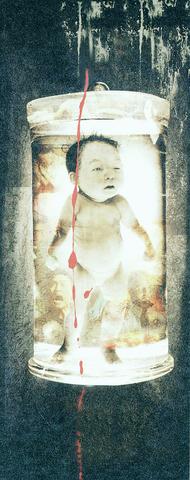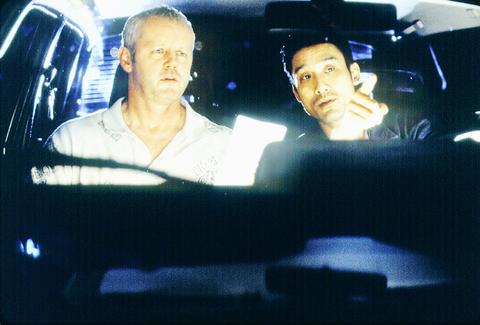As a thriller/horror film set in Taipei, Double Vision (
It is probably the first Taiwanese film to look at this often-gray city with a wild sense of imagination. Secondly, the plot centers around a mysterious sect of Taoism that operates using hallucination and serial murder. It's a great reflection of this modern yet superstition-laden city.

For Taiwanese filmmaking, Chen Kuo-fu's fifth film is heartening.

As a slasher flick, it provides non-stop horrors guaranteed to give audiences the creeps. The corpse of a baby floats in a glass container filled with formalin (this baby has two pupils in each eye). One character has his heart removed while still alive, and another gets his tongue ripped out. And as an added bonus, Chen throws in plenty of interesting information about Taoist ritual and biotech. Chen describes his production as "a film with a typical Hollywood structure but with Taiwanese content."
Huang Hou-tu (Tony Leung Kar-fai) is a glum police officer who has been relegated to a do-nothing job in the foreign affairs police after having caught his colleague in a corruption scandal. His daughter was later kidnapped by the convicted colleague and in the course of the abduction she was injured and has since suffered from trauma. Huang has been guilt-ridden ever since.
During a hot summer, three murders have taken place within a week. The head of a chemical industry group is found dead in his office. His body is cold as if he had been drowned in ice water, though he apparently never left his office. A legislator's mistress, who had been involved in several corruption scandals, is found murdered in her apartment. Her body has been burnt, though there is no sign of fire in her house. A few days later an American priest named Lorenzo, who was reportedly involved in arms deals between the US and Taiwan, is found dead in his church. He had been disemboweled and his intestines were washed and put back into his body.
The three were unacquainted, but the coroner discovers a mysterious black fungus in their brains, along with evidence that they had all died in a hallucinatory state.
Because of the mysterious nature of the murders and the confidential background of Lorenzo, the Americans send FBI agent Kevin Richter (David Morse) to help investigate. He teams up with the morose foreign affairs police detective Huang. The investigation runs into trouble straight away. First it is the cultural difference between the officers, then opposition from the Taiwanese vice squad who are worried that Richter will take all the credit.
As Richter and Huang dig deeper, they discover the murders have been carried out by hi-tech experts turned religious fanatics who have built a temple complex within their modern skyscraper.
Richter and Huang had no idea what they were getting into.
Being a film financed and co-produced by Hong Kong-based Columbia Pictures Film Production Asia, with a budget of reportedly US$60m, Double Vision indeed evinces Hollywood production values.
The cinematography provides a very real, and very detailed picture of the city and people, giving the story a cruel and surreal atmosphere. The special effects throughout the film are top-notch. Director Chen Kuo-fu, better known for his witty sarcasm and laments over the state of urban human relationships seems to have changed his style entirely.
Despite its visual quality, the film has some major flaws, notably its heavy-handedness. On the one hand it tries to explain a mystery, while on the other it deals with protagonist Huang's inner fears and depression. It also wants to depict cultural differences between the two investigators. Unfortunately, these elements fail to connect. The film spends too much time indulging in Taoist fantasy and making the hi-tech crimes look complicated rather than telling its story. On the other hand, the film manages to strike a good balance between introducing Chinese culture to the West without over-simplifying the mystery.
This is achieved at the expense of Richter and Huang's character development.
The audience will find it difficult to identify or emotionally connect with the hero played by Tony Leung. His guilt over the past accident and the failure of his marriage don't quite explain his later suffering. Director Chen said he intended to show more humanity in the story, but in this he fails to be convincing.
In its own way, Double Vision gives enough shocks and mystery, but it ultimately fails to be a totally satisfying movie.
Double Vision
Directed by: Chen Kuo-fu (陳國富)
Starring: Tony Leung Kar-fai
(梁家輝), David Morse, Rene Liu (劉若英), Leon Dai (戴立忍)
Running time: 117 minutes
Language: in Mandarin, English and Hokkien, with both Chinese and English subtitles
Taiwan Release: Today

June 2 to June 8 Taiwan’s woodcutters believe that if they see even one speck of red in their cooked rice, no matter how small, an accident is going to happen. Peng Chin-tian (彭錦田) swears that this has proven to be true at every stop during his decades-long career in the logging industry. Along with mining, timber harvesting was once considered the most dangerous profession in Taiwan. Not only were mishaps common during all stages of processing, it was difficult to transport the injured to get medical treatment. Many died during the arduous journey. Peng recounts some of his accidents in

“Why does Taiwan identity decline?”a group of researchers lead by University of Nevada political scientist Austin Wang (王宏恩) asked in a recent paper. After all, it is not difficult to explain the rise in Taiwanese identity after the early 1990s. But no model predicted its decline during the 2016-2018 period, they say. After testing various alternative explanations, Wang et al argue that the fall-off in Taiwanese identity during that period is related to voter hedging based on the performance of the Democratic Progressive Party (DPP). Since the DPP is perceived as the guardian of Taiwan identity, when it performs well,

A short walk beneath the dense Amazon canopy, the forest abruptly opens up. Fallen logs are rotting, the trees grow sparser and the temperature rises in places sunlight hits the ground. This is what 24 years of severe drought looks like in the world’s largest rainforest. But this patch of degraded forest, about the size of a soccer field, is a scientific experiment. Launched in 2000 by Brazilian and British scientists, Esecaflor — short for “Forest Drought Study Project” in Portuguese — set out to simulate a future in which the changing climate could deplete the Amazon of rainfall. It is

Artifacts found at archeological sites in France and Spain along the Bay of Biscay shoreline show that humans have been crafting tools from whale bones since more than 20,000 years ago, illustrating anew the resourcefulness of prehistoric people. The tools, primarily hunting implements such as projectile points, were fashioned from the bones of at least five species of large whales, the researchers said. Bones from sperm whales were the most abundant, followed by fin whales, gray whales, right or bowhead whales — two species indistinguishable with the analytical method used in the study — and blue whales. With seafaring capabilities by humans